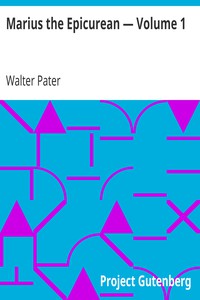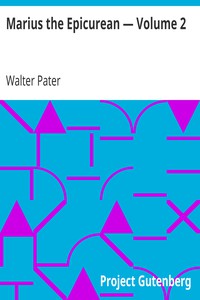Marius the Epicurean — Volume 1, Walter Pater [digital ebook reader .TXT] 📗

- Author: Walter Pater
Book online «Marius the Epicurean — Volume 1, Walter Pater [digital ebook reader .TXT] 📗». Author Walter Pater
WHITE-NIGHTS
To an instinctive seriousness, the material abode in which the childhood of Marius was passed had largely added. Nothing, you felt, as you first caught sight of that coy, retired place,—surely nothing could happen there, without its full accompaniment of thought or reverie. White-nights! so you might interpret its old Latin name.* “The red rose came first,” says a quaint German mystic, speaking of “the mystery of so-called white things,” as being “ever an after-thought—the doubles, or seconds, of real things, and themselves but half-real, half-material—the white queen, the white witch, the white mass, which, as the black mass is a travesty of the true mass turned to evil by horrible old witches, is celebrated by young candidates for the priesthood with an unconsecrated host, by way of rehearsal.” So, white-nights, I suppose, after something like the same analogy, should be nights not of quite blank forgetfulness, but passed in continuous dreaming, only half veiled by sleep. Certainly the place was, in such case, true to its fanciful name in this, that you might very well conceive, in face of it, that dreaming even in the daytime might come to much there.
* Ad Vigilias Albas.
The young Marius represented an ancient family whose estate had come down to him much curtailed through the extravagance of a certain Marcellus two generations before, a favourite in his day of the fashionable world at Rome, where he had at least spent his substance with a correctness of taste Marius might seem to have inherited from him; as he was believed also to resemble him in a singularly pleasant smile, consistent however, in the younger face, with some degree of sombre expression when the mind within was but slightly moved.
As the means of life decreased, the farm had crept nearer and nearer to the dwelling-house, about which there was therefore a trace of workday negligence or homeliness, not without its picturesque charm for some, for the young master himself among them. The more observant passer-by would note, curious as to the inmates, a certain amount of dainty care amid that neglect, as if it came in part, perhaps, from a reluctance to disturb old associations. It was significant of the national character, that a sort of elegant gentleman farming, as we say, had been much affected by some of the most cultivated Romans. But it became something more than an elegant diversion, something of a serious business, with the household of Marius; and his actual interest in the cultivation of the earth and the care of flocks had brought him, at least, intimately near to those elementary conditions of life, a reverence for which, the great Roman poet, as he has shown by his own half-mystic pre-occupation with them, held to be the ground of primitive Roman religion, as of primitive morals. But then, farm-life in Italy, including the culture of the olive and the vine, has a grace of its own, and might well contribute to the production of an ideal dignity of character, like that of nature itself in this gifted region. Vulgarity seemed impossible. The place, though impoverished, was still deservedly dear, full of venerable memories, and with a living sweetness of its own for to-day.
To hold by such ceremonial traditions had been a part of the struggling family pride of the lad’s father, to which the example of the head of the state, old Antoninus Pius—an example to be still further enforced by his successor—had given a fresh though perhaps somewhat artificial popularity. It had been consistent with many another homely and old-fashioned trait in him, not to undervalue the charm of exclusiveness and immemorial authority, which membership in a local priestly college, hereditary in his house, conferred upon him. To set a real value on these things was but one element in that pious concern for his home and all that belonged to it, which, as Marius afterwards discovered, had been a strong motive with his father. The ancient hymn—Fana Novella!—was still sung by his people, as the new moon grew bright in the west, and even their wild custom of leaping through heaps of blazing straw on a certain night in summer was not discouraged. The privilege of augury itself, according to tradition, had at one time belonged to his race; and if you can imagine how, once in a way, an impressible boy might have an inkling, an inward mystic intimation, of the meaning and consequences of all that, what was implied in it becoming explicit for him, you conceive aright the mind of Marius, in whose house the auspices were still carefully consulted before every undertaking of moment.
The devotion of the father then had handed on loyally—and that is all many not unimportant persons ever find to do—a certain tradition of life, which came to mean much for the young Marius. The feeling with which he thought of his dead father was almost exclusively that of awe; though crossed at times by a not unpleasant sense of liberty, as he could but confess to himself, pondering, in the actual absence of so weighty and continual a restraint, upon the arbitrary power which Roman religion and Roman law gave to the parent over the son. On the part of his mother, on the other hand, entertaining the husband’s memory, there was a sustained freshness of regret, together with the recognition, as Marius fancied, of some costly self-sacrifice to be credited to the dead. The life of the widow, languid and shadowy enough but for the poignancy of that regret, was like one long service to the departed soul; its many annual observances centering about the funeral urn—a tiny, delicately carved marble house, still white and fair, in the family-chapel, wreathed always with the richest flowers from the garden. To the dead, in fact, was conceded in such places a somewhat closer neighbourhood to the old homes they were thought still to protect, than is usual with us, or was usual in Rome itself—a closeness which the living welcomed, so diverse are the ways of our human sentiment, and in which the more wealthy, at least in the country, might indulge themselves. All this Marius followed with a devout interest, sincerely touched and awed by his mother’s sorrow. After the deification of the emperors, we are told, it was considered impious so much as to use any coarse expression in the presence of their images. To Marius the whole of life seemed full of sacred presences, demanding of him a similar collectedness. The severe and archaic religion of the villa, as he conceived it, begot in him a sort of devout circumspection lest he should fall short at any point of the demand upon him of anything in which deity was concerned. He must satisfy with a kind of sacred equity, he must be very cautious lest he be found wanting to, the claims of others, in their joys and calamities—the happiness which deity sanctioned, or the blows in which it made itself felt. And from habit, this feeling of a responsibility towards the world of men and things, towards a claim for due sentiment concerning them on his side, came to be a part of his nature not to be put off. It kept him serious and dignified amid the Epicurean speculations which in after years much engrossed him, and when he had learned to think of all religions as indifferent, serious amid many fopperies and through many languid days, and made him anticipate all his life long as a thing towards which he must carefully train himself, some great occasion of self-devotion, such as really came, that should consecrate his life, and, it might be, its memory with others, as the early Christian looked forward to martyrdom at the end of his course, as a seal of worth upon it.
The traveller, descending from the slopes of Luna, even as he got his first view of the Port-of-Venus, would pause by the way, to read the face, as it were, of so beautiful a dwelling-place, lying away from the white road, at the point where it began to decline somewhat steeply to the marsh-land below. The building of pale red and yellow marble, mellowed by age, which he saw beyond the gates, was indeed but the exquisite fragment of a once large and sumptuous villa. Two centuries of the play of the sea-wind were in the velvet of the mosses which lay along its inaccessible ledges and angles. Here and there the marble plates had slipped from their places, where the delicate weeds had forced their way. The graceful wildness which prevailed in garden and farm gave place to a singular nicety about the actual habitation, and a still more scrupulous sweetness and order reigned within. The old Roman architects seem to have well understood the decorative value of the floor—the real economy there was, in the production of rich interior effect, of a somewhat lavish expenditure upon the surface they trod on. The pavement of the hall had lost something of its evenness; but, though a little rough to the foot, polished and cared for like a piece of silver, looked, as mosaic-work is apt to do, its best in old age. Most noticeable among the ancestral masks, each in its little cedarn chest below the cornice, was that of the wasteful but elegant Marcellus, with the quaint resemblance in its yellow waxen features to Marius, just then so full of animation and country colour. A chamber, curved ingeniously into oval form, which he had added to the mansion, still contained his collection of works of art; above all, that head of Medusa, for which the villa was famous. The spoilers of one of the old Greek towns on the coast had flung away or lost the thing, as it seemed, in some rapid flight across the river below, from the sands of which it was drawn up in a fisherman’s net, with the fine golden laminae still clinging here and there to the bronze. It was Marcellus also who had contrived the prospect-tower of two storeys with the white pigeon-house above, so characteristic of the place. The little glazed windows in the uppermost chamber framed each its dainty landscape—the pallid crags of Carrara, like wildly twisted snow-drifts above the purple heath; the distant harbour with its freight of white marble going to sea; the lighthouse temple of Venus Speciosa on its dark headland, amid the long-drawn curves of white breakers. Even on summer nights the air there had always a motion in it, and drove the scent of the new-mown hay along all the passages of the house.
Something pensive, spell-bound, and but half real, something cloistral or monastic, as we should say, united to this exquisite order, made the whole place seem to Marius, as it were, sacellum, the peculiar sanctuary, of his mother, who, still in real widowhood, provided the deceased Marius the elder with that secondary sort of life which we can give to the dead, in our intensely realised memory of them—the “subjective immortality,” to use a modern phrase, for which many a Roman epitaph cries out plaintively to widow or sister or daughter, still in the land of the living. Certainly, if any such considerations regarding them do reach the shadowy





Comments (0)